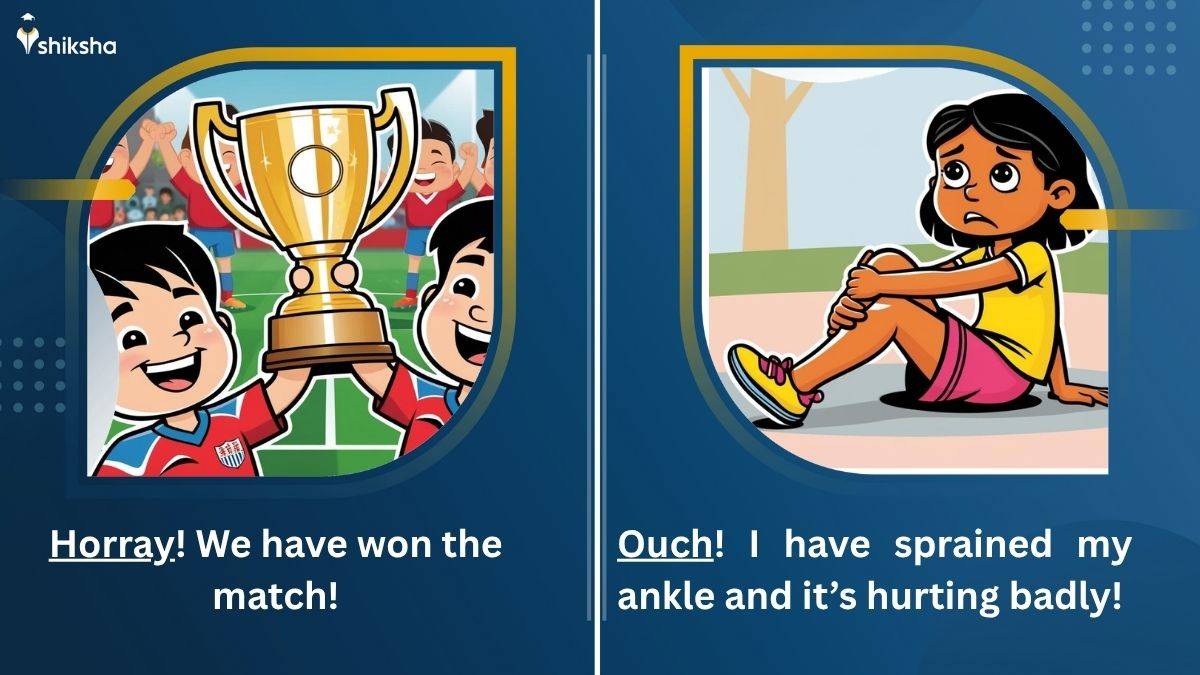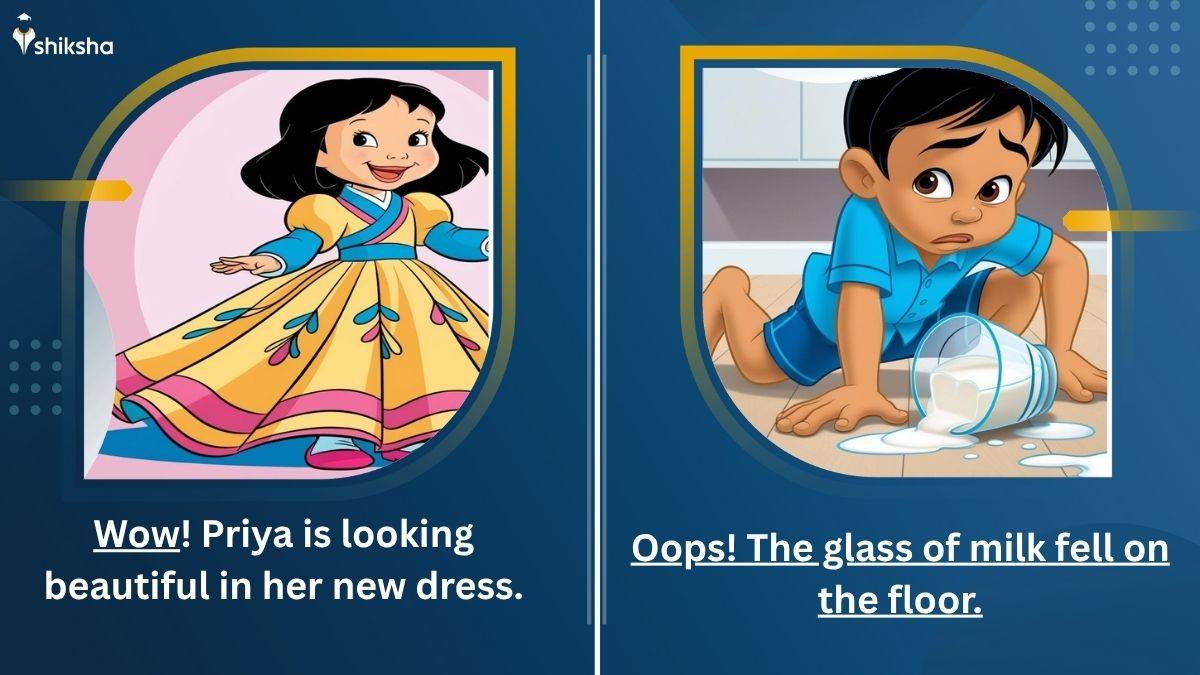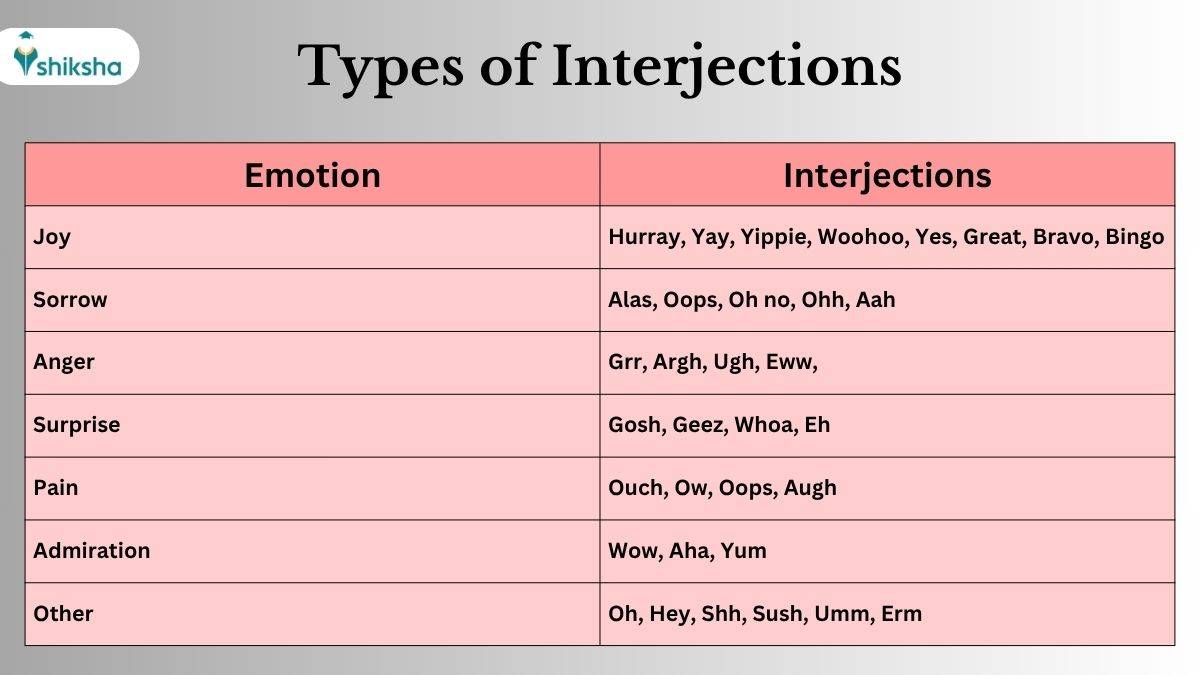
Interjection is an important chapter of English grammar. It is a part of speech which predominantly adds an expression to a sentence to help understand the mood of the sentence. Some common examples of interjections are ‘Wow’, ‘Ouch’, ‘Oh my’, ‘Eeks’, etc. While there may not be a literal meaning of Interjections, these words set the tone of the communication.
Interjections carry a high weightage in the English syllabus for competitive entrance exams like CAT, XAT, CUET UG, SSC GD, UGC NET, CTET, etc. Hence, knowing the basics of Interjections, along with the usage and examples, is of prime importance for cracking these entrance exams or to improve spoken and written English skills.
- What is Interjection?
- Definition of Interjections
- Types of Interjections
- Grammar Rules of Interjections
- Interjection Vs Conjunction
- Interjection Vs Preposition
- Preparation Tips to Master Interjections
- Common Grammar Errors to Avoid When Using Interjections
- Best Books to Prepare and Practice Interjections
- Examples of Interjections
- Interjection Exercises with Examples
- FAQs Regarding Interjections
What is Interjection?
To say in simple words, an Interjection is a word or words used in between a sentence to express thoughts or feelings. These are commonly used to express strong emotions such as joy, surprise, anger, sorrow, etc.
Although interjections are not compulsory, or we may not use them often, Interjections are commonly used during conversations, stories or novels, with the purpose of enhancing the mood of the person concerned or to describe the atmosphere in the case of a narrative.
Examples:
Yippie! Dad has got ice cream for us!
Alas, the vacations ended too soon!
While ‘Yippie’ is symbolising joy, ‘Alas’ symbolises sorrow.
Also Read:
Definition of Interjections
The definition of Interjections, as per the Oxford Dictionary, is: “A short sound, word or phrase spoken suddenly to express an emotion.” Oh!, Look out! and Ow! are interjections.
Pronunciation:
/ˌɪntəˈdʒekʃn/
/ˌɪntərˈdʒekʃn/
Word Origin: late Middle English: via Old French from Latin interjectio(n-), from the verb interjicere, from inter- ‘between’ + jacere ‘to throw’.
Interjection Definition by Collins Dictionary
As per the Collins Dictionary, the definition of Interjection is: “An interjection is something you say which interrupts someone else who is speaking.”
Pronunciation:
ˌɪntəˈdʒɛkʃən
Word Origin: ME interjeccioun < MFr interjection < L interjection
Also Read:
Types of Interjections
Interjections can be divided into five broad types. Here is the explanation and examples of each of the Interjections.
Primary Interjections
Primary interjections are sounds or expressions which only act as interjections and do not have any other function, such as that of a noun, pronoun, verb, etc. These interjections consist of single words such as Oh, Ouch, Yay, Oops, etc.
Examples:
- Yippie! We won the cricket match today!
- Ouch! I sprained my ankle during my exercise.
Secondary Interjections
A Secondary Interjection plays a dual role of a part of speech (noun, verb, adjective, etc.), along with an interjection to express an emotion or mood of the sentence.
Examples:
- Oh no! It has started raining!
- Thank God! I reached the airport on time despite the traffic jam!
Volitive Interjections
Volitive Interjections are used to express strong emotions such as surprise, anger or excitement. This type of Interjection is mostly used in exclamatory sentences. Volitive Interjections are also used as a command or instruction, wish or request.
Examples:
- Shh! Don’t make noise in the classroom!
- Psst! Please pass me a glass of water!
Emotive Interjections
Emotive Interjections are words or expressions used to express a reaction to certain actions or situations. Emotive Interjections are mainly used in situations of anger, disgust, delight or sadness.
Examples:
- Eww! That looks disgusting!
- Wow! The cake looks yummy!
Cognitive Interjections
A Cognitive Interjection refers to words which express thoughts or thought processes, such as ‘Umm’ or ‘Hmm’. This type of interjection is mainly used as a response to a conversation.
Examples:
- Umm, I don’t think this is a good idea!
- Oh, I see that you have already made up your mind!
Grammar Rules of Interjections
Here are some grammar rules of Interjections which must be followed to avoid common mistakes.
1. An interjection is used at the beginning of the sentence to set the context.
Examples:
- Wow! What a beautiful day!
- Gosh! What a narrow escape!
2. An interjection can be Yes or No: At times, the words ‘Yes’ or ‘No’ are used as interjections and are not meant literally.
Examples:
- Yes! I knew that we would win the match!
- No way! This can’t be true!
3. Some interjections are used in the middle of the sentence to add a break or a pause, and also add a meaning or value to the sentence.
Examples:
- I thought I would reach office on time, but alas, I missed the bus.
- I bought this new dress, and wow, it’s looking amazing!
4. Interjections are used mostly in informal or casual conversation or writing, and are generally avoided in formal communication.
Examples:
- Yikes! I did not see that coming!
- Ugh! When will this boring lecture end?
Punctuation Rules for Interjections
Apart from the above rules, here are a few more rules of Interjections in terms of punctuation:
- An Interjection can form an entire sentence, wherein the punctuation used is an exclamation mark or a full stop. Example: Yuppie! We are going on vacation!
- In case of using an Interjection as a sentence, it should be followed by a comma or a hyphen. Example: Oh God, I can’t believe you are saying this.
- While using an interjection in the middle of a sentence, it should be preceded and followed by a comma, hyphen or bracket. Example: I thought of taking Rita’s help, but huh, she was nowhere to be found!
- In case of using the interjection at the end of the sentence, the word should be preceded by a comma or hyphen. Example: I have lost my phone, argh!
Interjection Vs Conjunction
The basic difference between interjection and conjunction is that the former is a word exclaiming emotion, the latter joins words, phrases or clauses. The following table brings the differences between interjection and conjunction.
| Parameter |
Interjection |
Conjunction |
|---|---|---|
| Definition |
Words or group of words expressing emotions |
Words connecting other words, phrases or clauses |
| Function |
To express emotions or feelings like joy, surprise, anger, etc. |
Join or connect two parts of a sentence |
| Types |
Primary, Secondary, Volitive, Emotive, Cognitive |
Coordinating, Subordinating and Correlative |
| Examples |
Wow, Oh, Ouch, Yay |
And, Or, But, Because |
| Impact |
Emphasises the tone or emotion of the sentence but does not change the meaning of the sentence |
Affects the meaning or flow of the sentence |
Interjection Vs Preposition
The basic differences between Interjection and Preposition are given in the table below.
| Parameter |
Interjection |
Preposition |
|---|---|---|
| Definition |
Words or groups of words expressing emotions |
Prepositions establish relationships between nouns/pronouns and other words in the sentence, indicating location, time, direction, etc. |
| Function |
To express emotions or feelings like joy, surprise, anger, etc. |
It introduces a prepositional phrase to modify another word in the sentence |
| Types |
Primary, Secondary, Volitive, Emotive, Cognitive |
Preposition of place, time, direction, manner, cause, reason and purpose |
Preparation Tips to Master Interjections
While Interjection may seem to be a simple chapter of grammar, it needs some preparation and practice as well. Here are a few preparation tips for Interjection:
- Know the list of Interjection words: There are a plethora of Interjection words which you must know and memorise to use them appropriately in a sentence or a conversation.
- Use the right Interjections: It is equally important to use the right interjection words in a sentence, as per the mood and tone of sentences, otherwise the meaning of the sentence will change. For example, Hurray, it’s raining! This interjection in the sentence denotes joy. On the other hand, Oh no, it’s raining again! This interjection denotes frustration or irritation.
- Use Interjections at the right place: Interjections must be used at the right place of the sentence, at the beginning, middle, or end, and should be followed or preceded by interjections.
- Read as much as possible: The more you read, the more you will get to understand the types and usage of interjections. Reading short stories, novels, comics, etc., to improve your interjection skills.
- Practice: As they say, practice makes a man perfect. Hence, the more you practice, the more you will excel in Interjections.
How to Identify Interjections in a Sentence
It is easy to identify interjections in a sentence. Here are a few easy steps or guidelines to identify interjections in a sentence.
- Look for expressive words: Look for words such as ‘Yippie’, ‘Hurray’, ‘Oh no’, ‘Ouch’, ‘Wow’, etc. in a sentence. These words would not have a literal or dictionary meaning but would set a meaning to the sentence.
- Usage of punctuation: There must be at least one punctuation mark before or after the interjection word. Hence, if you find a unique-sounding word with a punctuation mark coming before or after, or both, then it is an interjection.
- Interjections are grammatically independent: Interjections are generally grammatically independent. These words are not grammatically connected, nor would they impact the meaning of the sentence as such.
Common Grammar Errors to Avoid When Using Interjections
Best Books to Prepare and Practice Interjections
Examples of Interjections
Interjection Exercises with Examples
FAQs Regarding Interjections
Commonly asked questions
What are the different types of Interjections?
The Interjections can be divided into five broad types:
· Primary Interjections
· Secondary Interjections
· Volitive Interjections
· Emotive Interjections
What are some of the most common Interjections?
Some of the most common Interjection words include the following:
· Wow
· Yay
· Yippie
· Ouch
· Oops
· Oh God
· Oh no
· Yikes
· Hush
· Umm
· Eh
· Argh
· Ugh
The above list is inclusive but not absolute.
What is an interjection?
An interjection is one of the eight parts of speech, which are defined by one or a couple of words used to express the mood or emotion. Although the Interjection does not impact the meaning of the sentence as a whole but acts as an ornamentation in the sentence.
What is the significance of using Interjections in a sentence?
Interjections add value to a sentence and give a clarity of the mood of the speaker or narrator. While it may not have an impact on the meaning, it can emphasise the emotion or the sentiment. However, it must be noted that Interjections are mostly used during informal communication and should be avoided during formal communication. Even if it is a must to use Interjections in formal sentences, it should be restricted to a few generic words such as 'umm', 'uhh', 'erm', etc.
What are the common punctuation marks put around Interjections?
Punctuations which are commonly put around Interjections include comma (, ), semicolon (;), and exclamation marks (!). Some of the other punctuations are hyphen (-) or full stop (.).
English Interjections Exam
Student Forum
Other Topics under this Chapter
Other Class 10th English Chapters
- English Past Tense
- English Idioms
- English Punctuation
- English Analogy
- English Interjections
- English Prefixes
- English Adjectives
- English Future Continuous Tense
- English Letter Writing
- English Suffix
- English Grammar
- English One Word Substitution
- English Mood
- English Direct and Indirect Speech
- English Figures of Speech
- English Composition
- English Para Jumbles
- English Reading Comprehension
- English Sentences
- English Auxiliary and Modal Verbs
- English Formation of Words
- English Precis Writing
- English Nouns
- English Adverbs
- Conjunctions
- English Prepositions
- English Verbs
- English Paraphrasing
- English Articles
- English Subject and Predicate
- English Pronouns
- English Tenses
- English Active and Passive Voice
- English Vocabulary
- English Subject Verb Agreement
- English Phrases
- English Synonyms
- English Etymology and Roots
- English Spelling Rules
- English Parts of Speech
- English Gerunds



